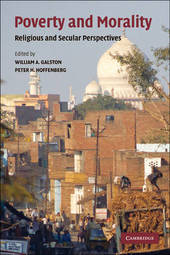
|
Poverty and Morality: Religious and Secular Perspectives
Paperback / softback
Main Details
| Title |
Poverty and Morality: Religious and Secular Perspectives
|
| Authors and Contributors |
Edited by William A. Galston
|
|
Edited by Peter H. Hoffenberg
|
| Physical Properties |
| Format:Paperback / softback | | Pages:330 | | Dimensions(mm): Height 226,Width 152 |
|
| Category/Genre | Ethics and moral philosophy
Social and political philosophy |
|---|
| ISBN/Barcode |
9780521127349
|
| Classifications | Dewey:170 |
|---|
| Audience | | Professional & Vocational | |
|---|
| Illustrations |
6 Tables, unspecified; 11 Line drawings, unspecified
|
|
Publishing Details |
| Publisher |
Cambridge University Press
|
| Imprint |
Cambridge University Press
|
| Publication Date |
20 September 2010 |
| Publication Country |
United Kingdom
|
Description
This multi-authored book explores the ways that many influential ethical traditions - secular and religious, Western and non-Western - wrestle with the moral dimensions of poverty and the needs of the poor. These traditions include Buddhism, Christianity, Confucianism, Hinduism, Islam, and Judaism, among the religious perspectives; classical liberalism, feminism, liberal-egalitarianism, and Marxism, among the secular; and natural law, which might be claimed by both. The basic questions addressed by each of these traditions are linked to several overarching themes: what poverty is, the particular vulnerabilities of high-risk groups, responsibility for the occurrence of poverty, preferred remedies, how responsibility for its alleviation is distributed, and priorities in the delivery of assistance. This volume features an introduction to the types, scope, and causes of poverty in the modern world and concludes with Michael Walzer's broadly conceived commentary, which provides a direct comparison of the presented views and makes suggestions for further study and policy.
Author Biography
William A. Galston is a Senior Fellow at the Brookings Institution. He has also taught at the University of Maryland, College Park, and served as Deputy Assistant to President Clinton and Executive Director of the National Commission on Civic Renewal. His most recent books include Liberal Pluralism: The Implications of Value Pluralism for Political Theory and Practice (Cambridge University Press, 2002) and Liberal Purposes: Goods, Virtues, and Diversity in the Liberal State (Cambridge University Press, 1991). Peter H. Hoffenberg is Associate Professor of History at the University of Hawai'i, Manoa, where his courses include Comparative Economic History and The History of Economic Thought. He is the author of An Empire on Display: English, Australian, and Indian Exhibitions from the Crystal Palace to the Great War (2001) and numerous articles and book chapters. He is currently writing a book about the British Empire and poverty.
Reviews'The challenges posed by poverty are both universal and particular. To meet them, we need social science and policy making to be informed by the diverse normative frameworks through which poverty is viewed around the world. The essays in this collection maintain the high standard of previous Ethikon volumes, offering riches to general readers and specialists alike. Poverty and Morality will enable us to both appreciate the constraints that exist in dealing with poverty cross-culturally, and discover possibilities for creative and constructive solutions both at home and abroad.' Stephen C. Angle, Wesleyan University 'Combining economics and sociology with philosophy and theology, this book brings multiple moral traditions into dialogue about the ever more complex problem of global poverty. It will be of use to students and scholars in many academic traditions, and it provides food for thought for people of conscience in all the major cultures of our interdependent world.' Richard Madsen, University of California, San Diego 'Poverty and Morality: Religious and Secular Perspectives is a thoughtful and engaging book on an important subject. It will be of interest to people in a wide variety of disciplines, including philosophy, comparative ethics, political theory, and development studies. The individual essays are clearly written, interesting as stand-alone pieces, but especially instructive because they are set in the context of other traditions' treatment of these same questions. Poverty and Morality offers a wealth of rich, detailed arguments on how different traditions have framed ethical issues connected to poverty, which is very instructive, given the current debates on global justice. Throughout this volume, the various authors not only connect the authoritative texts and assumptions of various different ethical traditions with the political and intellectual world in which they were writing, but also address the perennial questions of the scope of our responsibility to ourselves and others, which are raised by the existence of the poor in our midst.' Margaret Moore, Queen's University, Canada
|